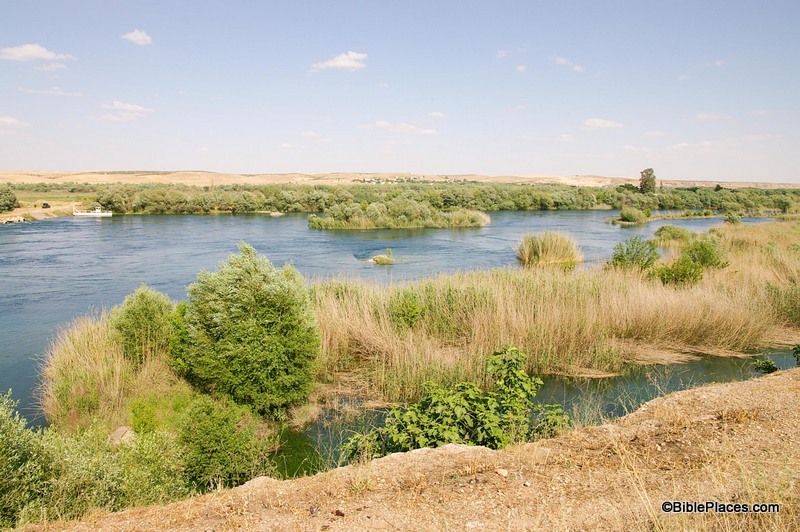This week’s photo comes from Volume 9 of the revised and expanded edition of the Pictorial Library of Bible Lands, which focuses on Eastern and Central Turkey. The photo was taken by A.D. Riddle and is entitled “Euphrates River North of Carchemish View East” (photo ID #: adr1005191623).
In addition to our picture of the week, I would also like to highlight the valuable annotations that come with the PLBL collection. The collection is not just a group of high resolution photos. It also includes Microsoft® PowerPoint® files with excellent notes providing valuable information about the sites and images. Over the years, I’ve found these notes to be a helpful, quick reference when I’m studying a certain site. Often these notes will include a brief biblical survey of a particular location. For example, the following information is provided in the PowerPoint® file on the Euphrates River:
The Euphrates River figures prominently in Scripture, being mentioned dozens of times from its first reference in Genesis 2:14 to the last reference in Revelation 16:12. The source of the river is in the mountains of Armenia northwest of Lake Van at an elevation of more than 10,790 feet (3,290 m). The river then flows through the modern countries of Turkey, Syria, and Iraq before merging with the Tigris River and emptying into the Persian Gulf, traveling a total distance of about 2,000 miles (3,200 km).
The Euphrates River in the Bible
1. The Euphrates River is one of four that flowed from the Garden of Eden (Gen 2:14).
2. The Lord promised to give Abraham the land between the Euphrates River and the river of Egypt (Gen 15:18; cf. Deut 1:7; 11:24; Josh 1:4; 24:2).
3. Jacob fled from Laban across the Euphrates River (Gen 31:21).
4. King David built a monument along the Euphrates River (2 Sam 8:3; 1 Chr 18:3).
5. Solomon ruled over all the kingdoms as far north as the Euphrates River (1 Kgs 4:21, 24; 2 Chr 9:26; cf. Ps 72:8).
6. The Lord promised to bring an invader from the other side of the Euphrates River (Isa 7:20; 8:7), but also to bring them back from exile from beyond the Euphrates River (Isa 11:15) and restore their dominion over the land “from the River to the ends of the earth” (Zech 9:10, LEB).
7. Jeremiah accused the Israelites of faithlessness to the Lord by asking why they went to “drink the waters of the Euphrates” (Jer 2:18, LEB).
8. The sixth angel will pour out his bowl on the Euphrates, causing it to dry up and allow passage of the enemy kings to attack Israel (Rev 16:12).
As you can see from the numerous verses listed above, a study of the Euphrates River takes you on a journey from Genesis to Revelation. Along the way, you encounter Abraham, Jacob, David, Solomon, Isaiah, Jeremiah and others. A study of this one geographic feature provides a platform for you to review (or have your students review) the entire arc of the biblical story, and it can provide a creative way for you to test your students’ knowledge of the Bible. Try this as an essay question or an ice breaker in your next OT survey class:
“The Euphrates River is mentioned in Gen. 2:14, Gen. 15:18, Gen. 31:21, 2 Sam. 8:3, 1 Kgs. 4:21, Isa. 7:20, Jer. 2:18, and Rev. 16:12. What is the biblical period and approximate date of each of these references?”
If a student can answer that question, then they know their stuff. Most likely, you could drop them anywhere in the Bible and they will have their bearings.
This and other photos of the Euphrates River are included in Volume 9 of the Pictorial Library of Bible Lands and can be purchased here.
